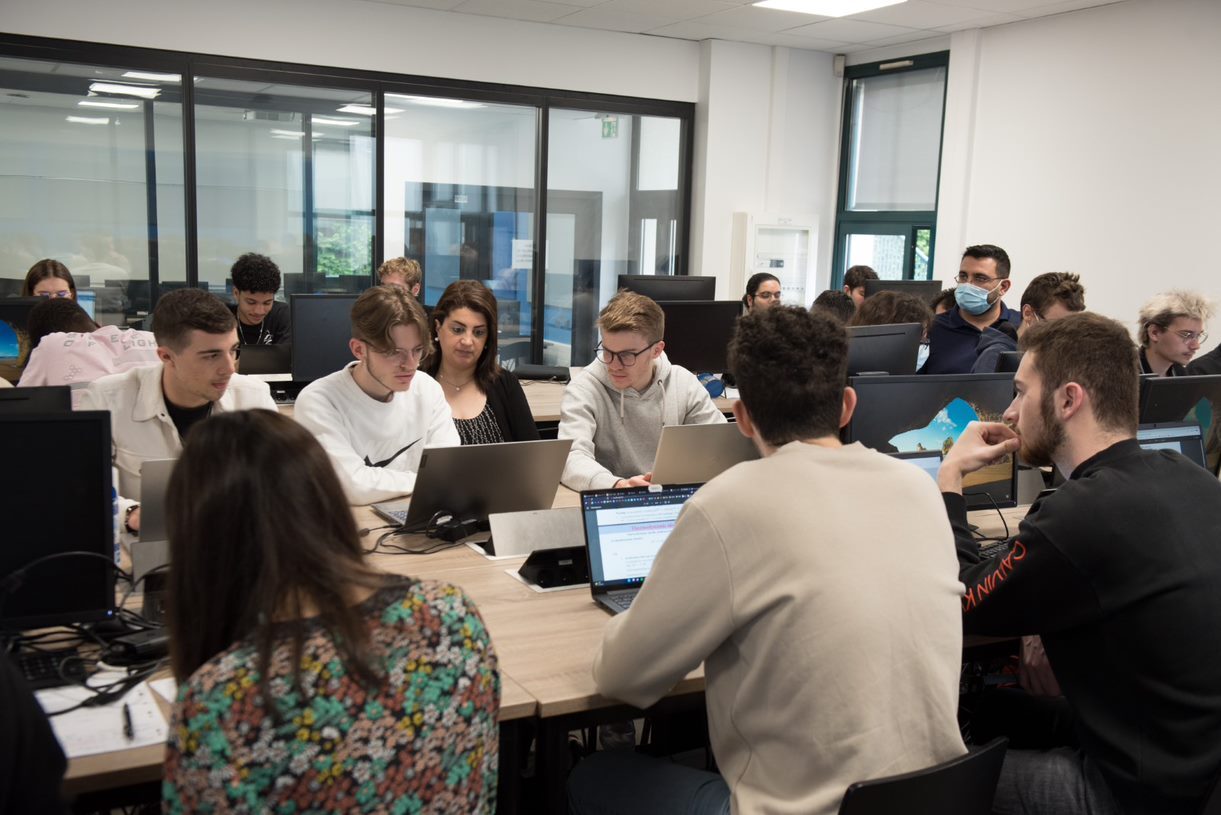Ce module a été développé afin de rendre le site Efrei accessible au plus grand nombre.
Si malgré notre vigilance, vous rencontriez le moindre problème d’accessibilité sur notre site, n’hésitez pas à nous contacter à l’adresse site-groupe@efrei.fr ou par téléphone au +33 188 289 000.

Engineering Program
Efrei Offers a five-year integrated Master Program
The Efrei curriculum offered by Efrei combines the integrated preparatory cycle, scientific and technical training with the general and professional engineer training.
The fundamental basis of Efrei’s training consists of mathematics, physics, electronics, computer science and digital technologies, and the “general and professional training” component allows students to project themselves in their future responsibilities in terms of communication but also in the management of projects, teams, or companies, including internationally.
Efrei offers an open, comprehensive, and leading-edge curriculum with a wide range of opportunities for students wishing to pursue a career in the world of digital technologies.
- 3 years of undergraduate education
- 2 years at the graduate level
We are committed to training engineers conscious of others and open to the world, combining technical expertise and interpersonal know-how as innovators or entrepreneurs. In order to achieve this result, we are constantly striving to innovate, in a dynamic of digital and pedagogical transformation. At the same time, we solicit and develop the autonomy of the students, thanks to a responsive student support approach to help each individual to learn better, to improve their self-awareness and to drive the development of his/her competencies.
Nicolas Sicard, Dean of Studies and Research
Our Undergraduate Program
Efrei Paris’s undergraduate program is composed of scientific and technical engineering courses that are both general in nature and career-goal oriented.
- 3 years
- 6 Semesters
- Including 2 to 6 months of paid internships
While mathematics, physics, electronics and computer science are at the heart of the engineering program at Efrei, the general education and professional courses allow future engineers to prepare themselves for their professional responsibilities. Students not only improve their communication skills, but they also gain experience through running projects, working in teams and getting work experience in companies (including at the international level).

Our Graduate Program
Our Graduate Program is accredited by France’s only engineering accreditation board (CTI) and by the French Ministry of Higher Education and Research— since 1957.
Students develop and refine their career goals, making them job-ready in a number of sectors using information and digital technologies.
Because students work essentially to improve all the living conditions of society, the engineer in computer science and digital technologies represents the first manufacturer of the world of tomorrow.
Through their scientific, technical and managerial skills, students are naturally called upon to assume high responsibilities.

While engineers generally benefit from excellent conditions on the job market, digital technology is undoubtedly the most dynamic sector in terms of job creation and development and will remain so for many years to come.
- A 2-year program (24 months)
- Including 10 to 12 months of paid internships
- Graduate students choose a combination of Master Program courses and elective modules
Program Overview
|
Program |
Year |
Semester |
Credits |
| Graduate Program 2 years – 4 semesters
120 ECTS |
Final year of the graduate program | S10 | 30 ECTS |
| S9 | 30 ECTS | ||
| First year of the graduate program | S8 | 30 ECTS | |
| S7 | 30 ECTS | ||
| Undergraduate Program 3 years – 6 semesters
180 ECTS |
Final year of the undergraduate program | S6 | 30 ECTS |
| S5 | 30 ECTS | ||
| Second year of the undergraduate program | S4 | 30 ECTS | |
| S3 | 30 ECTS | ||
| First year of the undergraduate program | S2 | 30 ECTS | |
| S1 | 30 ECTS |
The European Credit Transfer System (ECTS)
The ECTS is the international standard by which Efrei assesses students’ academic progress in the 5-year engineering program.
A full-time student earns 60 credits a year (30 ECTS a semester).
The ECTS credits can only be earned once students have completed and received their grades for a course.
| ECTS Grades | Distribution | GPA Score | |
| A | Top 15% of ECTS Unit averages | Having validated the ECTS Unit with 10/20 or above at the end of the semester, before sitting a make-up exam | 4 |
| B | The following 25% of ECTS Unit averages | 3 | |
| C | The following 35% of ECTS Unit averages | 2 | |
| D | The following 25% of ECTS Unit averages | 1 | |
| E | Having validated the ECTS Unit after sitting a make-up exam | 0 | |
| F | ECTS Unit not validated before or after sitting a make-up exam | 0 | |